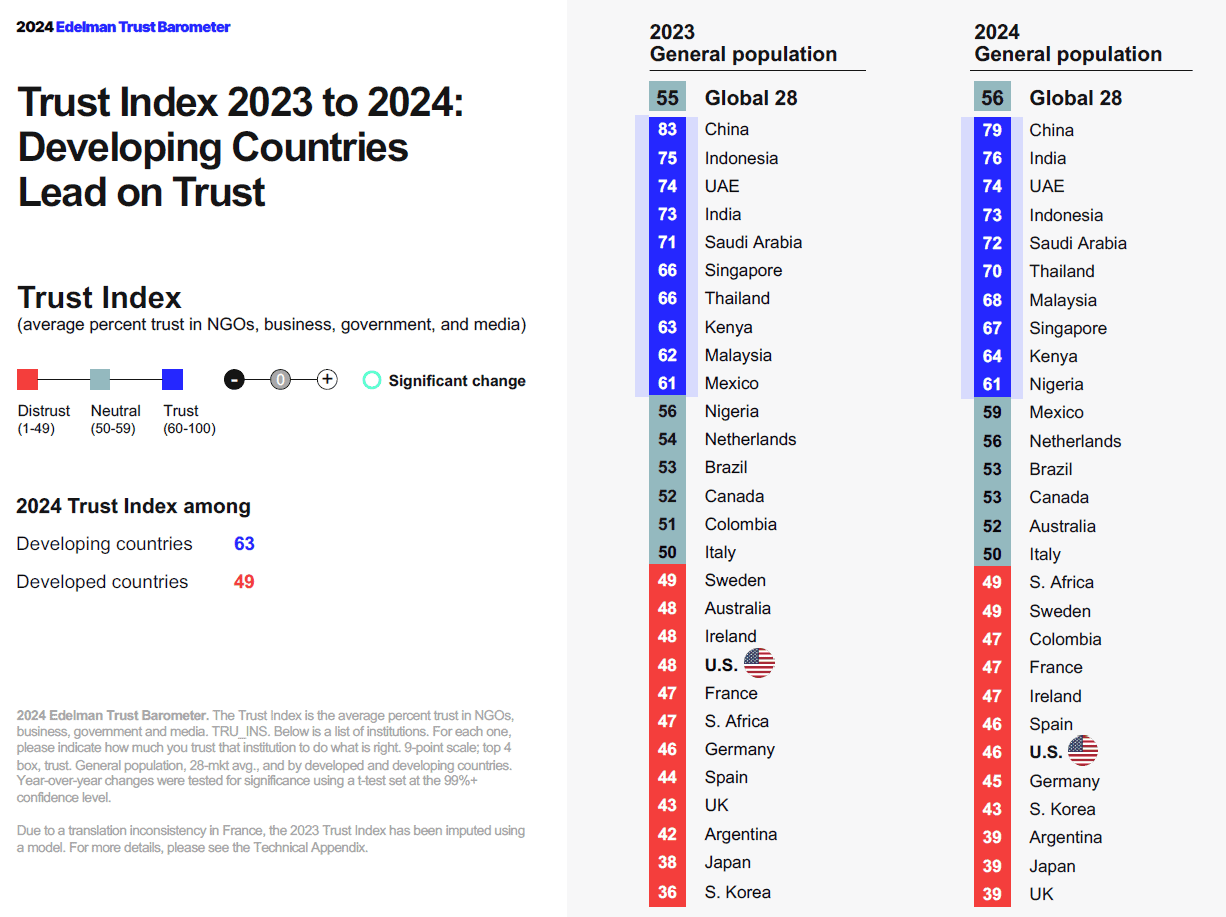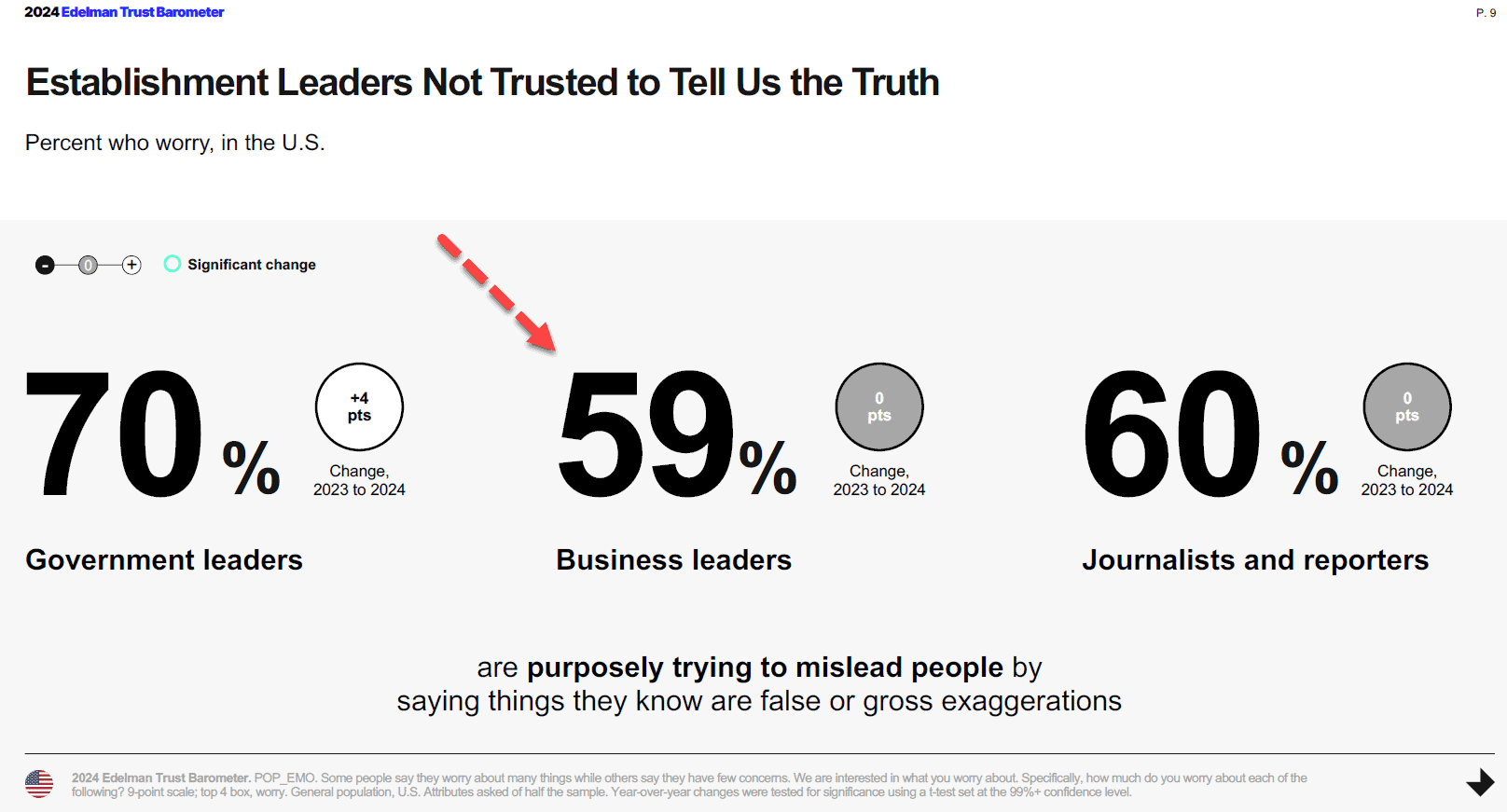The Value of Values When Organizations Lose Trust
As we enter a heated political period, I’m left with a simple and important idea. When an organization sacrifices its values, it tends to suffer over time.
How, for example, did Boeing sacrifice its values of engineering to void its safety culture? I’m sure it was a lot of small “profit-centered” decisions that ultimately resulted in a plane crash. How does Starbucks stock suffer a ten-year stagnation? A lot of small “revenue-growing” decisions slowly moved the company away from its revered position as a “third-place” to becoming a high-priced coffee retailer.
Without getting into US politics, it’s clear to me that hundreds of “small decisions” can entice an institution to sacrifice its values. And it feels like this has happened here. Look at the Edelman Trust Index and how it continues to decline. Whatever your political persuasion, US politics have hurt our institutions. And some politicians fuel mistrust in order to win.
 |
And this loss of values hurts business. While government is among the least trusted institution (Biden did help it increase), today 59% of Americans do not believe business leaders tell the truth. This, to me, is our own responsibility to fix.
 |
Such mistrust leads to a low confidence in innovation. Surprisingly, only 30% of Americans trust in AI today, largely because they see it as job-killing tech. This is why 70% want CEOs to speak openly about the impact of technology on jobs, careers, and economic growth. People are thirsty for reliable sources of information, and I think we saw some of this honesty in Intuit and UKG’s announcements last week.
While there are many complex issues, the message is clear. Every institution, particularly our companies, must live by its values to create trust and credibility with customers, employees, and stakeholders.
Most CEOs operate with values of growth, profitability, and market share. These values, as clear as they seem, are simply not enough. If your company doesn’t have a broader mission or purpose, profit-seeking alone can lead you astray.
Why? Because profit is not a goal, it is the outcome of a mission. And when you lose the mission and chase financial results you lose trust, loyalty, and long term value. In the case of our country, a myriad of “politically motivated” decisions led us to where we are. In the case of your company, only you, as a leader, can question when values are going astray.
I meet with many amazing company leaders every day. And in the companies I admire the most, there is always an astounding set of values firmly in place. Microsoft lives to help people improve their productivity. Gucci believes in luxury experiences that help people find themselves. And Colgate believes in building a healthier place for people, pets, and the planet.
These grandiose ideas sometimes seem silly, but among institutions they’re more valuable than you think. Organizations make thousands of decisions each day (who to hire, how to serve a customer, how to allocate resources), and when the values are lost to “profit” or “growth,” these decisions may diminish your value.
As “valueless” decisions pile up, disaster can result. Boeing’s agreement to criminal prosecution or Enron’s ultimate bankruptcy are good examples. And in the case of the US, our rankings in trust show the same. (The US is the #1 global economy in GDP yet 46th in trust.)
Civility Can Suffer When Values Are Left Behind
One more point. I just read a disappointing report from SHRM on the state of civility in the US. In the middle of political debate, kindness and respect are also in decline.
Believe it or not, 38% of US workers feel their workplace is uncivil, and 58% believe the level of incivility has significantly increased in the last two years. The word “civility” means respect, politeness, and courtesy in speech. I would argue that today’s “uncivil” behavior among politicians and the media simply makes trust more difficult. (Today only 9% of Americans trust congress and 12% trust TV News.) Our responsibility in business is to run our organizations on values, and within those values we must treat each other with respect.
I equate corporate values with citizenship, a sense of responsibility to greater society. In these uncertain times of political change, let’s focus on values and civility in our companies. I can assure you it will give you strength, endurance, and prosperity.
Additional Information
Giving Voice to Values (Josh Bersin Academy Certificate Course)
Citizenship On The Rise: What This Means To Business and HR
World-Class Diversity and Inclusion: Elevating Equity (Josh Bersin Academy Certificate Course)


